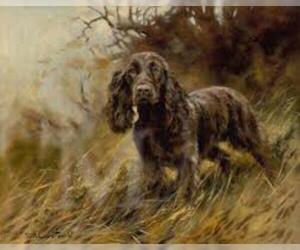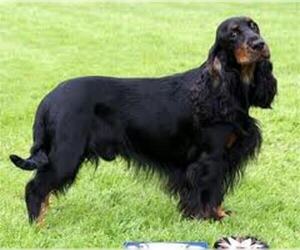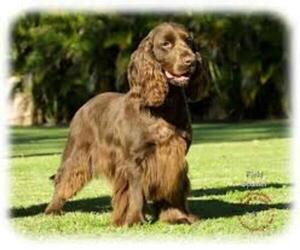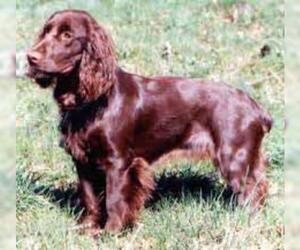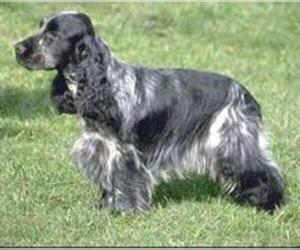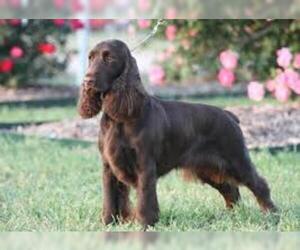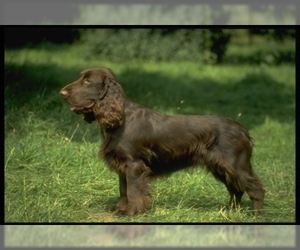
All about Field Spaniel dog breed
A.K.A. :Field, FS, Field Gun Dog, British Field, Field Flusher, Field Retriever, Field Companion, English Field Spaniel, Field Scout, Field Bird Dog, Field Pup, Woodland Spaniel, Field Hunter, Gentle Field, Spaniel Tracker
Size
Grooming requirements
Exercise requirements
Good with other dogs
Watchdog ability
Energetic
Training requirements
Playful
Affectionate
Good with other pets
Good with children
Good with strangers
Winter
Summer
Healthiness
Protective
Life Span
| Pure Breeds | Member |
| Breeds A - Z | F |
| Breeds by Group | Gun Dog Sporting |
| Breeds by Trait | Good With Kids Low Shedding Smartest Dog Breeds |
| Overview: | The Field Spaniel is a medium-sized, charming gundog with a rich history, originating in 19th-century England as a darker, heavier Cocker Spaniel. Physically, they are robust and well-balanced, possessing a distinctive, long, flowing coat that comes in solid colors like black, liver, roan, or golden liver, often with tan points. Their expression is generally gentle and intelligent, framed by moderately long, feathered ears. Temperamentally, Field Spaniels are known for being affectionate, good-natured, and remarkably docile, making them excellent companions. They are intelligent and eager to please, responding well to consistent, positive training. While adaptable, their moderate exercise needs mean they thrive with daily walks and playtime. They can certainly fit into family life and even apartment living if their activity requirements are met. Regarding health, they are generally a robust breed, but like many purebreds, can be prone to certain conditions such as hip and elbow dysplasia, progressive retinal atrophy, and autoimmune thyroiditis, so reputable breeding is crucial. |
F.A.Q.
All You Need to Know About the Field Spaniel Breed
The Field Spaniel, originating in England, is a medium-sized, versatile sporting dog known for its gentle and even-tempered nature. They are affectionate and loyal, making them excellent family companions, especially with children and other pets, though early socialization is always beneficial. Physically, they boast a lustrous, water-resistant coat—typically black, liver, or roan—and soulful eyes, requiring moderate weekly brushing to prevent mats and maintain their elegant appearance. While adaptable, their moderate exercise needs mean daily walks or playtime are essential; they are not ideally suited for small apartment living unless exercise is diligently managed. Generally robust, common health considerations for the Field Spaniel include hip and elbow dysplasia and eye conditions. Prospective owners will find them intelligent and eager to please, making training a rewarding experience for this charming breed.The average weight for a Field Spaniel is 45 pounds. Healthy weight for Field Spaniel adults typically ranges from 35-50 pounds. While there isn't a significant difference, males often fall on the higher end of this Field Spaniel weight range, and females on the lower to mid-range. This average size is ideal for their active and sturdy build.
Field Spaniel Height: What's the Average Size of This Breed?
If you're wondering, "how tall is a Field Spaniel?" you've come to the right place! Understanding the Field Spaniel height is crucial for potential owners comparing breed dimensions and ensuring a good fit for their home and lifestyle. These charming dogs are known for their moderate size, making them a comfortable companion for many.The average height of a Field Spaniel, measured at the shoulder (withers), typically falls within a specific range for adult dogs. You can expect an adult Field Spaniel to stand between 17 to 18 inches tall. This makes them a medium-sized dog, not too small to be delicate and not so large as to be overwhelming.While this range provides a good general idea, it's worth noting that individual genetics and gender can play a small role. Males tend to be at the higher end of the spectrum, sometimes reaching the full 18 inches, while females might be closer to the 17-inch mark. However, these variations are usually minor, and both genders fit comfortably within the established breed standard.So, when considering a Field Spaniel, remember that their average size at the shoulder is around 17-18 inches. This makes them a wonderfully manageable and adaptable breed for a variety of living situations!The Field Spaniel colors accepted by the AKC are black, roan (blue roan, orange roan), liver (chocolate), gold (red), and combinations with tan points. Solid colors may have limited white on the chest. Rare coat types and exotic Field Spaniel variations like sable, merle, or dilute colors (e.g., blue, lilac) are not AKC recognized Field Spaniel colors and are highly uncommon, if they occur at all, indicating a potential mix-breed or non-standard lineage. Focus on the AKC-accepted colors when seeking a purebred Field Spaniel.
The Field Spaniel personality is generally described as gentle, affectionate, and loyal. This breed forms strong bonds with its family and thrives on companionship, making them excellent household pets. They are typically friendly with people and, with proper socialization, can be quite sociable with strangers, though some may exhibit a reserved nature initially.The temperament of Field Spaniel with children is typically good; they are known for being patient and tolerant, making them suitable companions for well-behaved children who understand how to interact with dogs. They also tend to get along well with other pets, especially if introduced thoughtfully and raised together. Their sociable nature extends to other canines, and they often enjoy the company of other dogs.While adaptable, their ideal living situation involves a home with a yard where they can exercise and explore. However, with sufficient daily walks and mental stimulation, they can adapt to apartment living as long as their exercise needs are met. They are not high-energy "bounce off the walls" dogs but do require regular activity to stay happy and healthy. The Field Spaniel is eager to please and intelligent, making them relatively easy to train with positive reinforcement methods. They are known for being sensitive, so harsh training is not recommended and can be counterproductive.
Field Spaniel Temperament & Personality TraitsThe Field Spaniel boasts a delightful temperament, making them a wonderful family companion. Known for their gentle, affectionate, and even-tempered nature, they are truly a joy to live with.Friendliness & Sociability: Field Spaniels are inherently friendly and sociable. They adore human companionship and thrive on being part of the family’s activities. While they may initially be a little reserved with strangers, they quickly warm up.Loyalty & Companionship: Expect unwavering loyalty from a Field Spaniel. They form strong bonds with their families and are devoted companions, always eager to be by your side. They can be prone to separation anxiety if left alone for extended periods, highlighting their need for companionship.Adaptability to Apartment Living: While they appreciate a good run, Field Spaniels can adapt to apartment living if their exercise needs are consistently met. Daily walks, playtime, and mental stimulation are crucial.Behavior with Children & Other Pets: Their gentle nature makes them generally excellent with children, especially when raised with them and properly socialized. They are typically good with other pets, particularly if introduced correctly during their formative years.Stubbornness & Sensitivity: While generally eager to please, Field Spaniels can sometimes display a touch of stubbornness, especially during training. They are also quite sensitive to harsh correction, responding best to positive reinforcement and gentle guidance. Consistent, patient training is key to success with this intelligent but sometimes sensitive breed. Their affectionate and eager-to-please nature usually outweighs any stubborn tendencies, making them a rewarding and loving companion dog.
Field Spaniel Care: Daily Maintenance & Health TipsCaring for a Field Spaniel involves understanding their specific needs. Grooming needs are moderate; their single coat requires weekly brushing to prevent mats and minimize shedding. Expect increased shedding twice a year. Wrinkle and ear cleaning are crucial: their adorable wrinkles and long ears are prone to infections. Clean wrinkles daily with a damp cloth and ensure ears are dry and free of debris after any moisture exposure, checking weekly for signs of infection.Exercise limitations are important for this generally low-energy dog breed. While they enjoy walks and playtime, Field Spaniels are prone to overheating. Avoid strenuous exercise during hot weather, especially due to their slightly brachycephalic (short-nosed) anatomy, which makes them climate sensitive. Monitor for signs of heatstroke. Daily moderate exercise, like two shorter walks, is usually sufficient.Dietary considerations involve a high-quality dog food appropriate for their life stage and activity level. Weight management is key, as Field Spaniels can easily become overweight, exacerbating joint issues and other health problems. Monitor calorie intake and avoid overfeeding.Common health concerns include skin issues, often related to their coat and wrinkles if not properly maintained. Regular grooming and cleaning help. Dental care is vital; daily brushing or dental chews help prevent periodontal disease, a common ailment in many breeds. Regular veterinary check-ups are essential for early detection and management of any health issues. Proper how to care for a Field Spaniel includes consistent training, socialization, and providing a loving home environment.
Field Spaniel Activity Level: Balanced & AdaptableThe Field Spaniel activity level can be best described as moderately active, striking a delightful balance between energetic bursts and serene downtime. These charming dogs are not hyperactive, but they definitely enjoy and require regular Field Spaniel exercise needs to stay happy and healthy.How active are Field Spaniel typically? They are known for their willingness to participate in activities but are equally content to relax with their family. Expect them to be enthusiastic about walks, playtime, and mental stimulation. While they love to run and explore in safe, open spaces, they also have an "off switch" and are generally calm indoors after their needs are met.Daily exercise needs for a Field Spaniel usually include at least 30-60 minutes of moderate activity. This can be a combination of walks, fetch, or off-leash play in a secure area. They thrive on interactive playtime and love games that engage their intelligence and scenting abilities. They are not typically high-intensity athletes, preferring steady, engaging activities over relentless, long-duration runs.It's important to note a key consideration regarding their brachycephalic (short-nosed) anatomy. While less extreme than some other brachycephalic breeds, Field Spaniels can be susceptible to overheating, especially in hot or humid weather, or during strenuous exercise. Always monitor their breathing, provide ample water, and avoid over-exertion during peak temperatures. They balance their short bursts of energy with long periods of rest, which is essential for their well-being.Are they suitable for active families or low-energy households? Field Spaniels are adaptable. They can thrive in active families who enjoy outdoor activities and are willing to include their dog, as long as the intensity is moderate and appropriate. For low-energy households, they can also be a good fit, provided their guardians are committed to fulfilling their daily exercise requirements and engaging them in playtime. They are not content to be couch potatoes all day but don't demand constant entertainment either.In summary, the Field Spaniel activity level is moderate and manageable. They are a wonderful choice for those seeking a dog that enjoys activity but also appreciates quiet companionship, making them a versatile and loving companion.
Breed Breakdown: What Experts Say About the Field Spaniel
I would rate the Field Spaniel's "Size" trait a 4 out of 10.The Field Spaniel is a medium-sized dog, falling squarely in the middle of the spectrum when compared to the vast array of dog breeds. They typically stand around 17-18 inches tall and weigh between 35-50 pounds. Their body structure is sturdy and well-built, but without the bulk or elongated frame of larger breeds. While certainly not miniature or toy-sized, they are significantly smaller than giant breeds like Great Danes or even larger retrievers. They are a good fit for apartment living provided they receive adequate exercise, as their moderate size doesn't demand vast open spaces indoors. Their portability also makes them relatively good travel companions, as they can fit comfortably in most vehicles without occupying the entire back seat. For households with space constraints, they are a much more manageable option than a truly large dog, though they still require enough room to stretch out and move around comfortably.
I would rate the Field Spaniel's grooming requirements as a 7/10.While not as demanding as some long-coated or curly-coated breeds, the Field Spaniel is far from a wash-and-go dog. Their medium-length, silky, water-repellent double coat requires regular attention to prevent matting and maintain its health. They shed moderately year-round, with heavier seasonal shedding, necessitating frequent brushing to remove loose hair and keep the coat tangle-free. Their pendulous ears are prone to infections if not regularly cleaned and checked for moisture and debris. Nail trimming is crucial, as with all breeds, and their moderate activity level means their nails won't always wear down naturally. While not typically plagued by deep skin folds, their double coat can be susceptible to "hot spots" if not properly dried after getting wet, and like many breeds, they can be prone to environmental allergies, which can manifest as skin irritation. Regular bathing, perhaps every 4-6 weeks, is needed to keep their coat clean and healthy. Overall, they require consistent, hands-on grooming, including brushing several times a week, regular ear care, and attention to their nails, making them a moderately high-maintenance breed compared to truly easy-care companion dogs.
I would rate the Field Spaniel's exercise requirements as a 7 out of 10.While not in the extreme high-demand category of some working breeds, the Field Spaniel is an active and intelligent dog bred for hunting, and they thrive on a good amount of daily activity. They possess a good amount of energy and a strong desire to be involved in family activities, which translates into a need for more than just a quick stroll around the block. They are capable of sustained movement and enjoy longer walks, hikes, and engaging in activities like retrieving. Their non-brachycephalic anatomy means they generally don't suffer from the respiratory limitations that plague some other breeds, allowing them to participate in more vigorous exercise without undue stress. They are well-suited for various types of exercise, from a good daily walk of at least an hour (which can be broken into two sessions) to energetic playtime in a secure yard, and many excel in dog sports like agility, obedience, and scent work. While they can adapt to a slightly less active household if given sufficient mental stimulation and a couple of good walks, they genuinely benefit from and require structured routines that involve both physical exertion and mental challenges to stay healthy, well-behaved, and mentally stimulated. Without adequate exercise, they can become bored and potentially destructive.
I would rate the Field Spaniel's "Watchdog Ability" as a 4 out of 10.While Field Spaniels are generally attentive and sweet-natured, they are not primarily bred for guarding or protection. They will certainly be alert to unusual sounds or the arrival of visitors and are likely to bark to announce these events. This makes them capable of providing *some* early warning. However, their barking is more of an announcement than an attempt to deter, and their inherently friendly and gentle disposition means they are far more likely to greet an unfamiliar person with a wagging tail and a desire for affection than with any kind of protective or territorial aggression. They lack strong territorial instincts that would motivate them to genuinely deter an intruder, and their size and temperament make them unsuitable for such a role. They are much more of a passive companion, happy to alert you to something new but not equipped or inclined to act as a significant deterrent.
I would rate the "Good with Other Dogs" trait of the Field Spaniel breed a 9 out of 10.Field Spaniels generally exhibit a remarkably amiable and adaptable nature towards other dogs, making them excellent companions in multi-dog households. Their typical behavior around unfamiliar dogs is one of curiosity and friendliness, rather than aggression or shyness. They tend to be quite tolerant of dogs of various sizes and energy levels, often adjusting their play style to match their canine companion. While early socialization is beneficial for any breed, Field Spaniels are inherently predisposed to getting along well with others, and mature individuals rarely display dominance issues or territorial aggression towards their own kind. They genuinely seem to thrive in canine company, enjoying interactive play and the companionship of other dogs. Careful introductions are always a good idea when bringing any new dog into a household, but with Field Spaniels, these introductions are typically smooth and result in peaceful coexistence.
I would rate the Field Spaniel's "Energetic" trait as a 7 out of 10.While not a hyperactive breed, the Field Spaniel is decidedly a working gundog at heart and possesses a good deal of stamina and a desire for activity. They are naturally active and enjoy being involved in family activities, especially those that involve a "job" or exploring. They have good endurance and thrive on regular walks, engaging playtime, and opportunities for scent work or field activities. Their playfulness is a key characteristic, and they enjoy a good romp in the yard or a game of fetch. They definitely require consistent physical stimulation to prevent boredom and maintain their muscular condition. Compared to many companion dogs, they are certainly more active and less inclined to be a couch potato, though they are also happy to relax with their family after a good exercise session.Regarding their brachycephalic anatomy, it's important to clarify that the Field Spaniel is NOT a brachycephalic breed. They have a moderately long muzzle and an open airway, which contributes significantly to their good stamina and exercise tolerance. This anatomical feature allows them to breathe efficiently, even during strenuous activity, and does not pose the same limitations on exercise that you would find in truly brachycephalic breeds. Therefore, their "energetic" rating is not negatively impacted by concerns about breathing difficulties during exercise.
I would rate the training requirements of the Field Spaniel breed as a 6 out of 10.While intelligent and eager to please their owners, Field Spaniels possess a typical spaniel exuberance and a moderate level of independent thought that can present challenges. They are generally responsive to commands but their attention span can be shorter, especially in stimulating environments, and they can be prone to "selective hearing" when a more interesting scent or sight presents itself. Consistency in training is absolutely crucial with this breed; any laxity can be quickly exploited. Positive reinforcement is highly effective, as they thrive on praise and rewards, but harsh methods will be counterproductive and damage their sensitive nature.This breed is not necessarily beginner-friendly for training, as their moderate stubbornness and potential for distraction might overwhelm someone new to dog ownership. While a beginner with dedication and a willingness to enroll in structured obedience classes could succeed, Field Spaniels generally benefit from an owner who understands how to maintain consistency, provide engaging mental stimulation, and navigate the typical spaniel "busy-ness" with patience and a sense of humor. They thrive with structured routines, clear expectations, and ongoing training that keeps their minds engaged.
I would rate the Field Spaniel's "Playful" trait a 7 out of 10.While not as boisterous as some working spaniels, the Field Spaniel is a naturally spirited and enthusiastic companion. They possess a good activity level and genuinely love games and interaction with their families. They are typically very responsive to toys and playtime, especially if it involves retrieving or sniffing out hidden treats. Their attention-seeking behavior is more about wanting to be involved and engaged rather than being constantly demanding. They exhibit a delightful enthusiasm in daily life, often greeting you with a wagging tail and an eagerness for whatever comes next. Compared to more laid-back companion dogs, they are definitely on the more active and fun-loving side, always up for a good romp or a puzzle toy, but they also appreciate downtime and cuddling.
I would rate the Affectionate trait of the Field Spaniel a 9 out of 10.Field Spaniels are renowned for their incredibly loving and people-oriented nature. They have a strong desire for human companionship and thrive on being an integrated part of the family. You can expect a Field Spaniel to be physically close, often seeking out cuddles, enjoying lap-sitting (even if they're a bit too big!), and leaning into their owners. Their loyalty is unwavering, and they are highly sensitive to their owner's emotions, often offering comfort or mirroring the mood of the household. This breed tends to follow family members around the house, preferring to be in the same room as their beloved humans. They truly thrive on affection and are far from independent compared to many other companion dogs, constantly seeking connection and interaction with their people.
I would rate the "Good with Other Pets" trait of the Field Spaniel breed a 9 out of 10.Field Spaniels are generally known for their gentle and amiable disposition, which extends to other animals. They typically get along very well with other dogs, often enjoying their company during play or walks. While they do possess a moderate prey drive common to many spaniel breeds, it's usually not excessively high and can be managed with proper training and early socialization. Many Field Spaniels coexist peacefully with cats, especially if introduced at a young age and raised together. They are not typically prone to significant resource guarding, although individual personalities will always vary. Their adaptable nature and eagerness to please make them excellent candidates for multi-pet households. While early socialization and consistent training are beneficial for any dog to ensure good manners around other animals, the Field Spaniel's naturally sociable and tolerant temperament means they often require less intensive intervention than some breeds to coexist peacefully with other pets, making them a relatively low-stress choice for such environments.
Rating: 8/10The Field Spaniel rates highly for its "Good with Children" trait due to its naturally gentle, affectionate, and patient temperament. They are generally described as calm and even-tempered, making them less prone to nipping or overreacting to the boisterousness that often comes with children. Their playful nature means they enjoy engaging in games and activities, making them good companions for active kids. Furthermore, Field Spaniels are known for their tolerance of noise and handling, typically taking accidental bumps or enthusiastic petting in stride. While they are naturally good-natured, like any breed, early socialization and consistent, positive reinforcement training will help them thrive in a family setting, ensuring they understand boundaries and can interact safely and happily with children of all ages. Supervision is always recommended, especially with very young children, to teach both the child and the dog appropriate interaction.
The Field Spaniel rates a 7 out of 10 for "Good with Strangers."While not inherently standoffish or aggressive, Field Spaniels are generally more reserved with unfamiliar individuals than some of the more boisterous spaniel breeds. They typically exhibit a polite, watchful curiosity rather than an immediate, effusive greeting. A well-socialized Field Spaniel will usually be friendly and accepting of strangers once they've had a moment to assess the situation, often warming up quickly. However, they aren't typically the type to rush up to every new person for attention. Early and consistent socialization is crucial to ensure they develop into confident, outgoing adults, preventing any potential shyness or excessive caution. Without proper exposure, some individuals might lean towards being a bit more reserved or hesitant. They are generally adaptable in public, but prefer to observe before engaging, and are unlikely to bark excessively or guard around guests once they are comfortable.
I would rate the Field Spaniel's "Winter" tolerance at a 6. While not an extreme cold-weather breed, the Field Spaniel possesses a reasonably dense, weather-resistant double coat that offers good insulation. Their moderate size and solid build help them retain warmth more effectively than very small breeds. They are not brachycephalic, meaning their respiratory system is generally well-suited for breathing in cold air without the challenges faced by flat-faced breeds. They enjoy outdoor activity and are generally quite hardy.However, they are not Arctic dogs and lack the very thick, oily coats and substantial body fat of breeds specifically adapted for very harsh winters. In extremely low temperatures or prolonged exposure, they are still susceptible to hypothermia, especially if wet. For most winter months in temperate climates, they can safely enjoy walks and play, but in truly cold climates with significant snowfall and freezing temperatures, they will require special care compared to many other companion dogs. This includes providing a warm, dry shelter, limiting outdoor time during the coldest parts of the day, and considering the use of protective gear like sweaters or paw balm for extended outings. They definitely shouldn't be left outdoors unsupervised for long periods in freezing weather.
I would rate the Field Spaniel's "Summer" tolerance at a 6.While not as severely brachycephalic as some breeds, the Field Spaniel does possess a slightly shorter muzzle compared to many other spaniel types, which can modestly impact their ability to efficiently cool themselves through panting. They are a double-coated breed, meaning they have a dense undercoat designed for insulation, which can make them more prone to overheating in hot and humid conditions. They are also an active breed, originally bred for hunting, and their desire to move can sometimes lead owners to push them too far in warm weather.Field Spaniels are certainly not as sensitive as extremely brachycephalic breeds like Bulldogs or Pugs, who are at a much higher risk of heatstroke. However, they are not as tolerant as breeds with very long muzzles and single coats. They can regulate their body temperature reasonably well in mild summer conditions with appropriate hydration and shade, but in truly hot or humid weather (above 80°F or with high humidity), their risk of heatstroke increases significantly. Owners must be vigilant and significantly reduce outdoor activity, especially during the hottest parts of the day.Compared to other companion dogs, Field Spaniels do require special care in summer months. Their double coat means they need access to air conditioning or excellent shade and airflow, and exercise must be carefully managed to avoid overexertion. They cannot be left outside for extended periods in direct sun or high heat. While they aren't "fragile" in summer, their predisposition to overheating due to their coat and moderate muzzle length means owners must be proactive in preventing heat stress, more so than with a breed like a Labrador Retriever (who might be a 7 or 8) or a Greyhound (who might be an 8 or 9 due to their single coat and efficient cooling).
I would rate the Field Spaniel's "Healthiness" trait at a 7 out of 10.Field Spaniels are generally considered a robust breed compared to some other companion dogs, not typically prone to the extreme breathing difficulties seen in brachycephalic breeds or the widespread joint issues that plague some larger breeds. Their average life expectancy is a respectable 10-12 years, and often longer with good care. Responsible breeding plays a significant role in maintaining their health, with reputable breeders screening for common breed-specific concerns such as hip and elbow dysplasia, eye conditions (like progressive retinal atrophy), and occasional heart issues. While they aren't considered high-maintenance in terms of needing constant medical intervention, like any purebred, they do have genetic predispositions that require awareness. They can be prone to ear infections due to their long, pendulous ears, and some individuals may experience skin allergies. However, these are generally manageable with proper hygiene and veterinary care, and not as debilitating as the inherent health challenges faced by breeds with more extreme conformations or genetic loads. With preventive care and good nutrition, they tend to be happy, healthy companions.
I would rate the "Protective" trait of the Field Spaniel a 3 out of 10.While Field Spaniels are certainly alert and loyal to their owners, making them good at announcing a stranger's presence, their gentle and affable nature generally prevents them from being truly protective in a meaningful sense. They are not typically territorial in an aggressive way and their reaction to strangers is usually one of curiosity or friendliness, rather than suspicion or defensiveness. They lack the strong guarding instincts, physical presence, and assertive demeanor required for effective protection. The Field Spaniel is primarily a companion dog, and while they will devotedly stick by their family, they are more likely to greet an intruder with a wagging tail and a happy bark than with a display of genuine protective aggression. They are more suited to being a "doorbell" than a "security guard" and would not be considered capable of offering meaningful protection in a household setting beyond an initial alert.
I would rate the "Life Span" trait of the Field Spaniel breed a 7 out of 10.Field Spaniels are generally considered a long-lived breed compared to many other companion dogs. Their average life expectancy is typically between 10 to 14 years, and it's not uncommon for them to live even longer with proper care. While they are prone to some health issues common in many medium-sized breeds, such as hip and elbow dysplasia, eye conditions (like progressive retinal atrophy), and occasional hypothyroidism, these are often manageable with early diagnosis and treatment. Responsible breeding practices, including health testing of parent dogs, significantly reduce the incidence of these genetic predispositions. Furthermore, their moderate activity levels and generally good temperaments contribute to a lower risk of accidents or stress-related health problems that can shorten a lifespan. With attentive care, a balanced diet, regular exercise, and preventative veterinary check-ups, Field Spaniels can enjoy a fulfilling and extended life.
Field Spaniel Dogs for adoptionSee all dogs for adoption
Similar Dog Breeds for Field Spaniel
Quick Breed Selector 0 - not important, 1 - smallest, 10 - largest
Variants & Mistakes :Field Spanel, Feild Spaniel, Feild Spanel, Fielde Spaniel, Fielde Spanel, Fiel Spaniel, Fiel Spanel, Feld Spaniel, Feld Spanel, Fild Spaniel, Fild Spanel, Fyeld Spaniel, Fyeld Spanel, Fylde Spaniel, Fylde Spanel, Fielkd Spaniel, Fielkd Spanel, Fiedl Spaniel, Fiedl Spanel, Field Spaneil, Field Spaneal, Field Spanal, Field Spnaiel, Field Snpaniel, Field Spanie, Field Sapaniel, Field Spainel, Field Spianel, Field Spanielk, Field Spanile, Field Spanielm, Field Spanieln, Field Spanielb, Field Spnaie, Field Speaniel, Feildspaniel, Fieldspaiel, Fiels Spaniel, Fild Espaniel, Field Spaniyel
